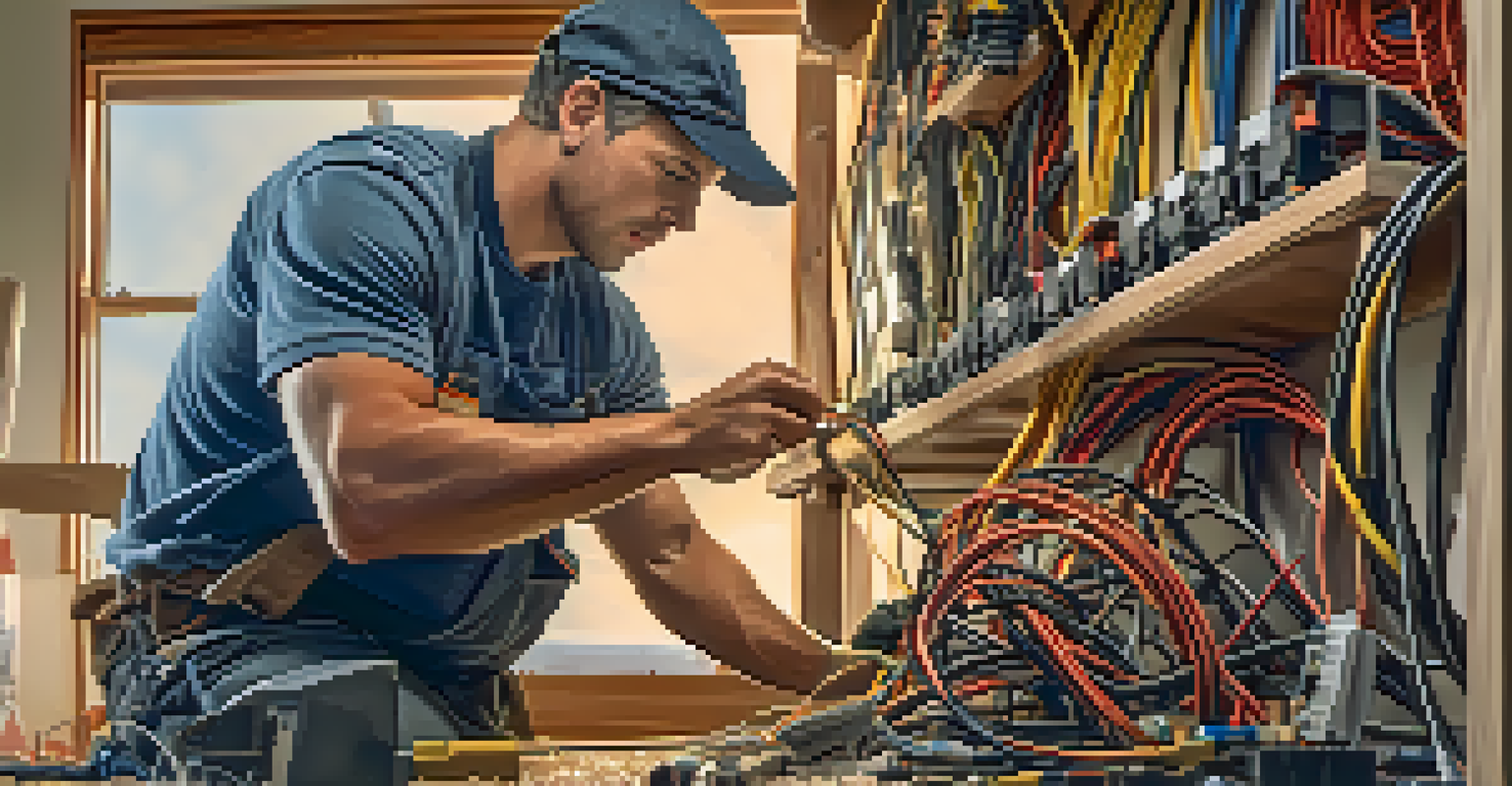Understanding Different Contractor Types for Home Projects

General Contractors: The Project Managers of Home Renovations
General contractors are the backbone of many home improvement projects. They oversee the entire renovation process, coordinating between different trades and ensuring everything runs smoothly. Think of them as the conductors of an orchestra, making sure every instrument plays in harmony.
The bitterness of poor quality remains long after the sweetness of low price is forgotten.
When you hire a general contractor, you can expect them to manage timelines, budgets, and the overall quality of work. They usually have a network of subcontractors, which can save you time in finding skilled labor. This means less hassle for you, as they take care of the nitty-gritty details.
However, it’s essential to choose a reputable general contractor. Look for reviews, ask for references, and check their credentials. A good contractor will not only complete the job efficiently but also keep you informed every step of the way.
Specialized Contractors: Experts in Their Craft
Specialized contractors focus on specific areas of home improvement, such as plumbing, electrical work, or roofing. Hiring these experts can be beneficial when you need a job done with precision and skill. For example, a licensed electrician will have the training to handle wiring safely, something a general contractor might not specialize in.

These contractors often have extensive experience in their field, allowing them to troubleshoot issues that may arise during a project. If you're doing a major renovation, bringing in specialized contractors can ensure that each aspect of the work meets high standards.
General Contractors Manage Projects
They coordinate renovations, manage budgets, and ensure quality work by overseeing multiple trades.
While they are usually hired for specific tasks, some homeowners hire them directly for smaller projects. Just be sure to check their licenses and insurance to ensure you’re getting a qualified professional for the job.
Subcontractors: The Skilled Hands Behind the Scenes
Subcontractors are often hired by general contractors to handle particular tasks on a project. They can include carpenters, painters, or HVAC specialists, among others. Think of them as the talented artists who create beautiful details in a larger masterpiece.
Good design is obvious. Great design is transparent.
While you may not interact with subcontractors as much, their expertise is crucial for the overall success of your project. They bring specialized skills and knowledge, enabling them to execute their part of the job efficiently and effectively.
If you're managing a project yourself, you might consider hiring subcontractors directly. Just remember to check their credentials and reviews, as finding the right subcontractor can make all the difference in the quality of your home improvements.
Design-Build Contractors: One-Stop Solutions for Home Projects
Design-build contractors combine both the design and construction processes under one roof. This approach can streamline your project and reduce miscommunication since the same team is responsible for both aspects. Imagine having a single point of contact who handles everything from the initial design to the final build.
This method often leads to faster project completion and can sometimes save you money. By eliminating the need for separate contracts, you’ll find the process smoother and more cohesive. Plus, design-build contractors often have a good grasp of budget constraints, which can help keep your project on track financially.
Specialized Contractors Offer Expertise
These professionals focus on specific skills, ensuring high standards in areas like plumbing and electrical work.
However, it’s essential to ensure that the design-build contractor has a solid portfolio and good reviews. A well-rounded team can turn your vision into reality while navigating any challenges that arise.
Freelance Contractors: Flexibility and Cost Savings
Freelance contractors can be a great option for smaller projects or tasks that require specific expertise without the need for a full team. They usually operate independently and can often be more flexible in terms of scheduling and pricing. Think of them as the freelance graphic designers of the home improvement world, ready to tackle jobs on their own terms.
While they might not offer the same level of oversight as a general contractor, freelance contractors can provide personalized service and attention to detail. This can be particularly beneficial when you have a clear vision of what you want and need someone to bring it to life.
That said, it's crucial to vet freelance contractors carefully. Since they may not have the same resources as larger firms, ensure they have the necessary skills and experience to manage your project effectively.
Handyman Services: Quick Fixes and Small Projects
Handyman services are ideal for small home repairs or minor renovations that don’t require a specialized contractor. These professionals can tackle a variety of tasks, from fixing leaky faucets to hanging shelves. Picture a handyman as your home’s trusty Swiss Army knife—versatile and always ready to assist.
Hiring a handyman can save you time and effort, especially for those nagging tasks that pile up on your to-do list. They often charge by the hour, making them a cost-effective solution for smaller jobs. Plus, you won’t have to fuss with permits or extensive planning for minor repairs.
Choosing the Right Contractor Matters
Defining your project scope, budget, and maintaining clear communication are key to selecting the right contractor.
However, it's important to ensure that the handyman you hire has the right skills for the specific tasks you need. Always check reviews and ask about their experience to ensure you're getting someone who can handle your home's needs.
Choosing the Right Contractor: Key Considerations
Selecting the right contractor for your home project can feel overwhelming, but it’s crucial for ensuring a successful outcome. Start by defining the scope of your project; knowing what you need will help you determine which type of contractor is best suited. For instance, if you’re planning a major renovation, a general contractor might be your best bet.
Next, consider your budget and timeline. Different contractors have varying pricing structures and availability, which can impact your project’s progress. It's wise to gather multiple quotes and ask about their timelines to make an informed decision.

Lastly, don’t underestimate the power of communication. A good contractor should be responsive and willing to discuss your ideas and concerns. Establishing a clear line of communication can make all the difference in achieving the results you want.